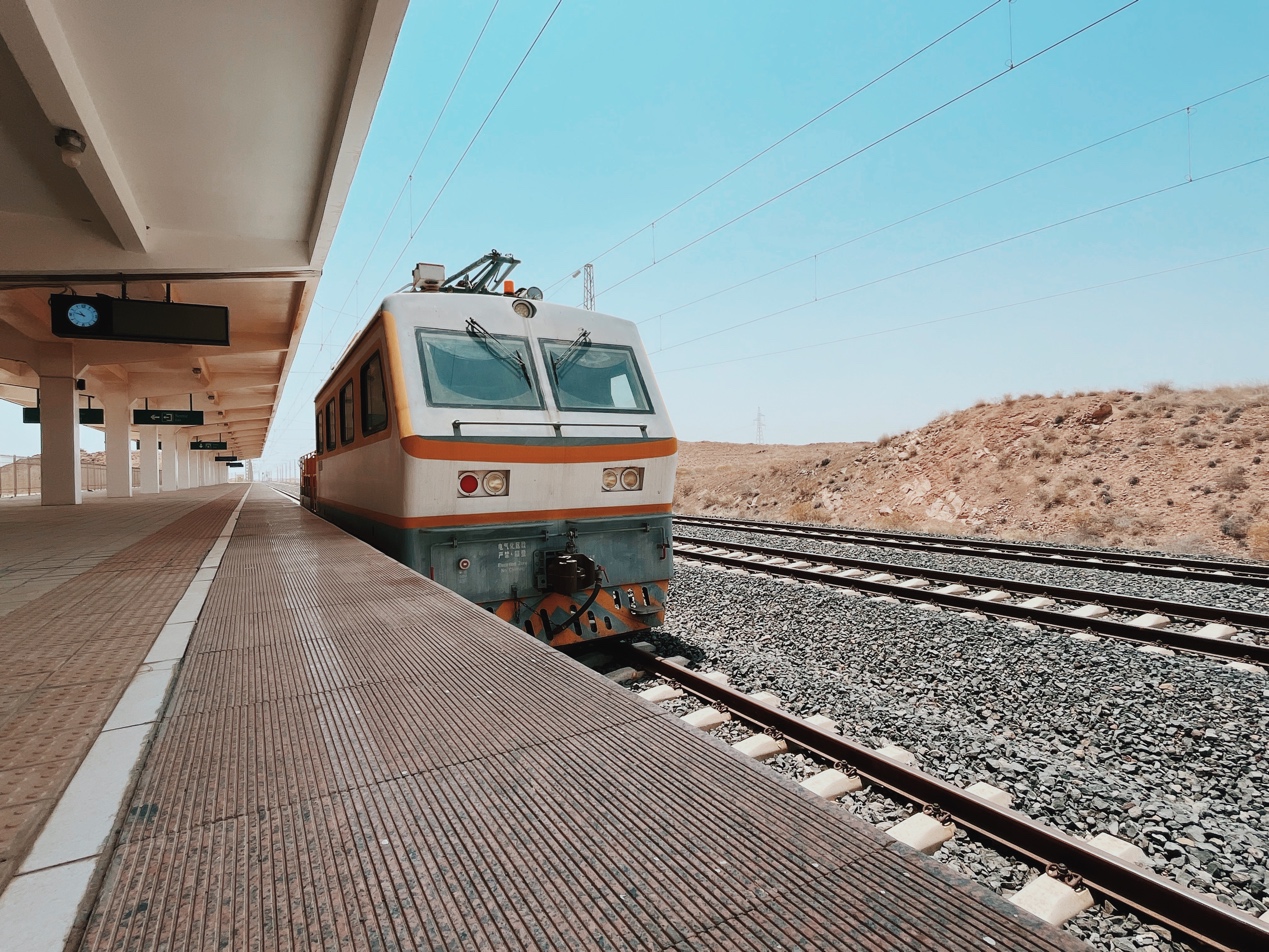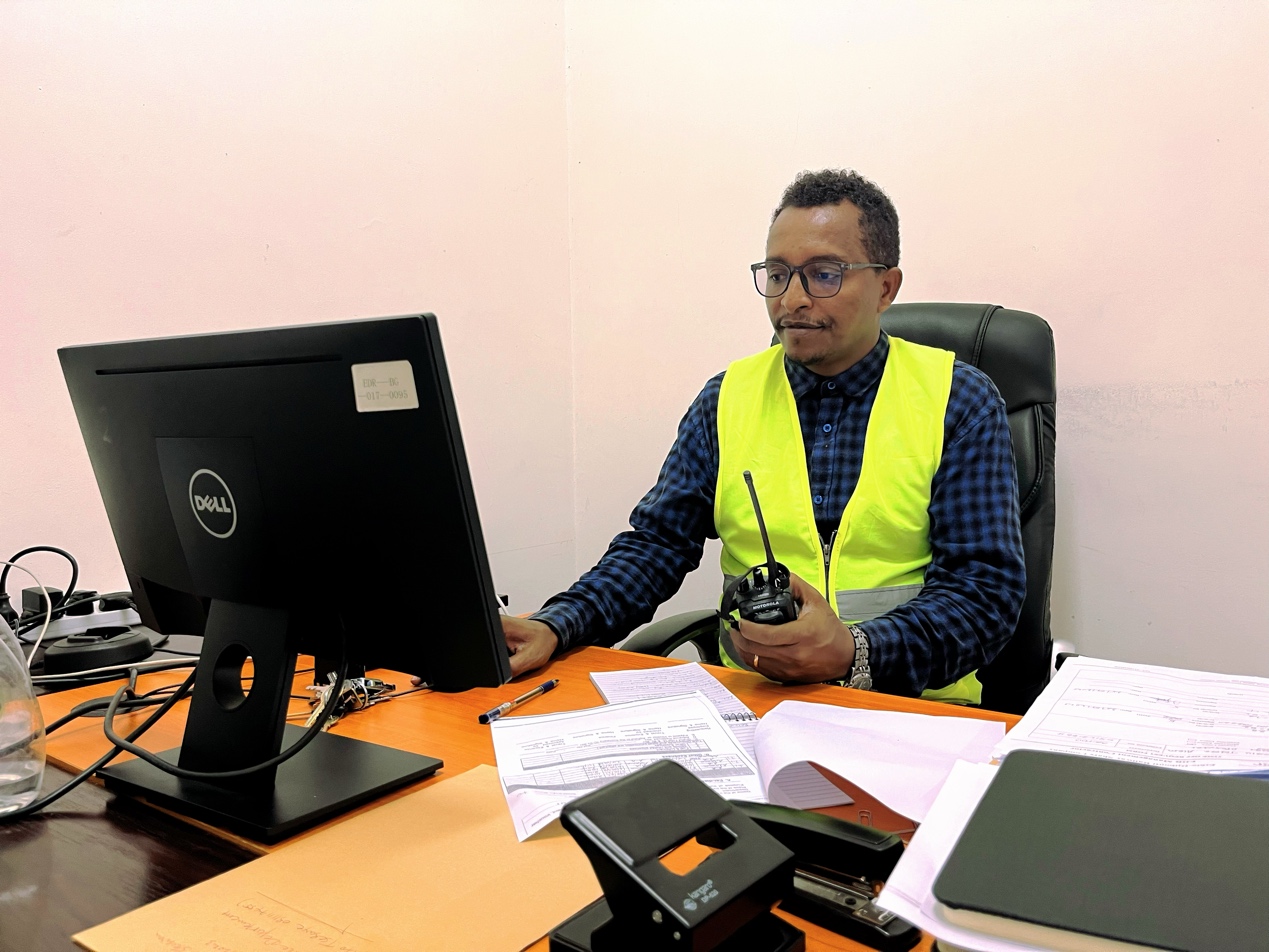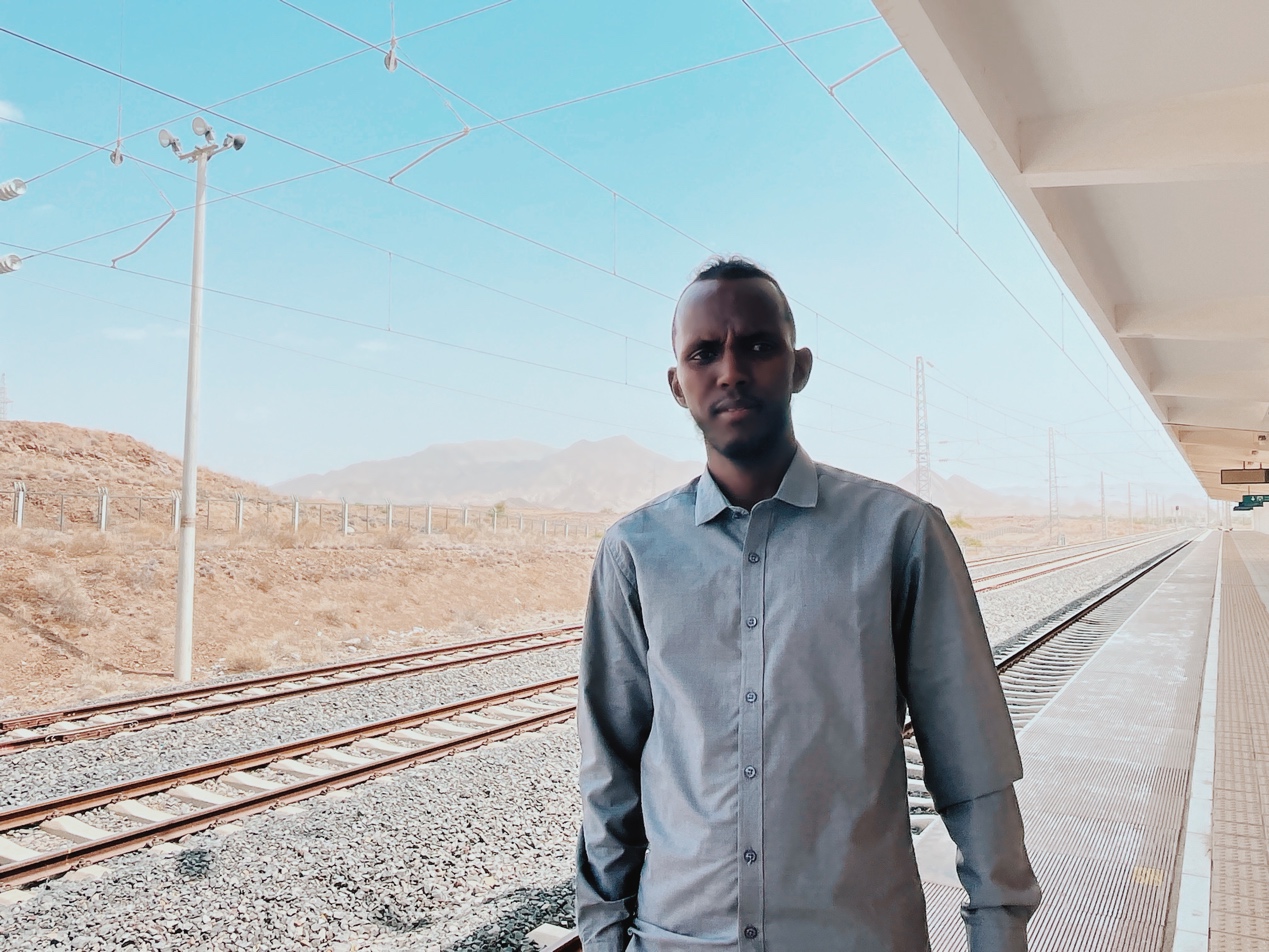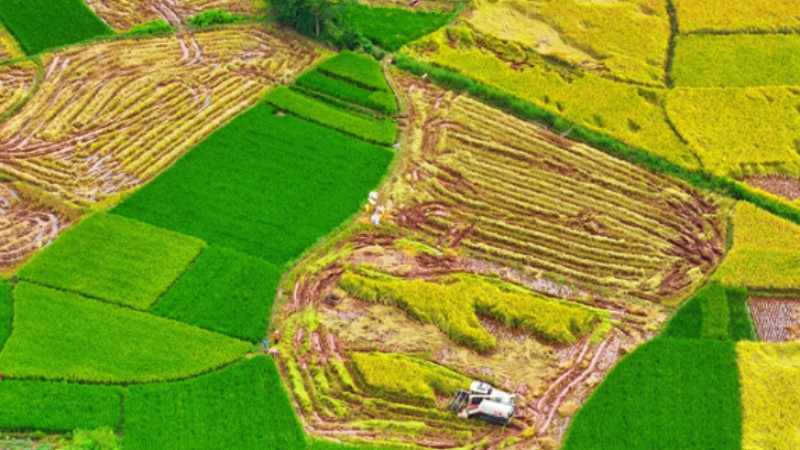Connecting Ethiopia and Djibouti: a railway built by the Chinese for the African people

Ali Sabieh station is a little oasis for travellers deep within the Djiboutian desert. Photo by Chi Zao.
Ali Sabieh station is a little oasis for travellers deep within the Djiboutian desert. The station’s little waiting room is teal with blue seats and a few plants on the windowsill, with customers dozing in the cool shade as they wait for the train.
The small station is located on the 752-km Addis Ababa-Djibouti railway, a flagship project under the China's Belt and Road Initiative, connecting landlocked Ethiopia and coastal Djibouti. It is the first electrified trans-boundary railway in Africa.
Fatouma Houssein Daher, a Djiboutian girl who frequently takes the train to Ethiopia, expressed her appreciation for the railway, saying that it represents the friendship between China and Africa.
“Taking the train to Ethiopia is a low-cost and comfortable option. It's lovely that the Chinese have helped us create our railway, and I'm proud of it,” she said.
Since it was put into operation in January 2018, the railway has seen 1,824 passenger trains pass through carrying nearly 530,900 people and 6,133 cargo trains with about 7,328,500 tonnes of goods. It has also cut the transportation time for goods from more than three days to less than 20 hours and reduced the cost by at least one third, substantially facilitating imports and exports from Ethiopia, a landlocked country in the Horn of Africa.
A railway heading towards prosperity
Located in Addis Ababa’s outskirts, the Indode cargo station is an important transportation center on the Addis Ababa-Djibouti railway. The station wasn't officially opened until 2018, but in 2016, when Ethiopia was hit by a devastating drought and food shortage, it served as an important freight hub, moving a total of 888,00 tonnes of grains to help feed the starving population.
There are around 200 people working at the station, only five of whom are Chinese. The majority of the top-tier positions have already been delegated to locals.

Ethiopian railway specialist Fasil Tadele has seen the Addis Ababa railway being built firsthand. Photo by Chi Zao.
Ethiopian railway specialist Fasil Tadele, 36, has seen the Addis Ababa railway being built first hand. For more than eleven years, he has worked on the Addis Ababa-Djibouti railway. After working as an engineer supervising the railway's construction, he was promoted to station manager in 2018 upon the opening of the Indode station.
“Ethiopia is landlocked; hence its best means of import and export is through Djibouti's port. For Ethiopia's economy to grow, the Addis Ababa-Djibouti railway is essential,” said Fasil.
Fasil says that it took three to seven days for cargo to go between Djibouti and Ethiopia before the railway was built. Costs were high and travel was unsafe. With the railroad, the journey now takes just 20 hours, which is not only faster but also safer.
"Over 80% of Ethiopians are farmers, but our country does not produce fertilisers, so we must import them from Djibouti's port. It used to take at least 70 trucks to move 2,590 tons of fertiliser from Djibouti to Ethiopia over three days; today one cargo train can make the trip in just 20 hours,” said Fasil.
“The railway has made it possible to ship Ethiopian coffee all over the world, and it has also opened up the rest of the world's goods to our people. This is, without a doubt, the railroad to success,” he added.

Souleiman Youssouf Ahmed, a railway expert from Djibouti, studied railway technology in China and is now in charge of the Ali Sabieh station alongside 71 Djiboutians and two Chinese staff. Photo by Chi Zao.
Manager of the Ali Sabieh passenger station in Djibouti, 32-year-old Souleiman Youssouf Ahmed, echoed Faisil's sentiments, noting that the railway has greatly improved the safety and convenience of travel between Djibouti and Ethiopia.
According to Souleiman, Djiboutians flock to the Ethiopian city of Dire Dawa throughout the summer to escape the stifling heat. Minibuses were the only option for getting from Dire Dawa to Ali Sabieh prior to the construction of the railway. While only designed to hold ten people, the minibus was frequently crammed with twenty. The minibus shared the road with the freight trucks, and accidents were common.
“The train cuts travel time by two hours while also providing passengers with the added bonuses of comfort and security. At its peak in the summer, the train has carried as many as 950 passengers in a single day,” said Souleiman.
Making it the "African People's Railway"

Adisu is a successful passenger train driver on the Addis Ababa-Djibouti railway after receiving his schooling in China. Photo by Chi Zao.
So far, the Ethiopia-Djibouti railway has created 55,000 jobs in Ethiopia and Djibouti and provided training opportunities for more than 3,000 professionals, laying a solid foundation for the development of the railway industry in the two countries, according to the Ethiopian government.
The Chinese government has been sending experts to Ethiopia and Djibouti to help train local talent in contemporary railway management while also offering scholarships for local students to study in China. In 2023, local employees account for over 90 percent of the total staff offering passenger and freight services.
Fasil and Souleiman lauded the "railway of the African people" connecting Addis Ababa and Djibouti as an example of the technological know-how transferred to Africa by the Chinese.
“I've learned a lot about railway technology and management from the Chinese. Right now, I'm teaching this sort of thing to my people. It's unbelievable that the Chinese are advising us on building our railway, which we now own,” said Fasil.
Souleiman, one of the 94 Djiboutians dispatched to China to study railway technologies in 2015, expressed gratitude to China for facilitating the transfer of technology to Africa.
“My Chinese friends have always been open and honest with us, and it's clear they hope Africans will be able to run the railroad on their own. There's no denying the sincerity of their assistance; the railway is an iconic representation of the bond between China and Africa,” he said.
Adisu Getachew, a 27-year-old passenger train driver on the Addis Ababa-Djibouti railway, studied railway technologies in China for eight months. As a boy, he had always wanted to see a real train like the ones in picture books, and he has now realized that dream by transporting passengers between Ethiopia and Djibouti every week.
“The railway has improved not only the economic situation in our countries, but also the communication amongst our citizens. I've noticed an incredible uptick in the number of visitors and businesspeople going back and forth between the two countries in recent years, it’s incredible,” said Adisu.
“Since I am now in the position of passenger train driver, I am interested in expanding my knowledge of railway technology, in particular that related to high-speed rail. It is one of my goals to return to China for further education,” he added.
Tears, joy, and names that must not be forgotten

Wang Tiantao, like many Chinese railway experts in Africa who have been away from home for years, misses his son and wife terribly. He believes his work in Africa is important, and hopes his African coworkers can learn the skills they'll need to keep the railway running well.
Many Chinese have spent years away from family and home, toiling in the sweltering heat and facing deadly diseases in Africa in a bid to build the railway for Africans.
Wang Tiantao, age 32, is a Chinese manager at the Indode station and has been away from his family for more than nine years. He was not there to support his wife while she gave birth to their son, and now the one-year-old toddler doesn't even recognise him.
"I videochat with my family on a daily basis. Despite my wife's best efforts, our son still doesn't recognise me as his father. I owe my family too much, and I miss them a lot,” he said with tears in his eyes.
Despite the hardships and the overwhelming feelings of homesickness, Wang is convinced that his work in Africa is worthwhile, and hopes that the Africans will be able to acquire the knowledge and skills they need to successfully operate their own railway.
"Although I miss my family very much, it is a great comfort to me that I have made many local friends here in Ethiopia, and that they are really kind to us," said Wang.
After years of working together, Fasil can attest to the fact that the Chinese have a genuine appreciation for Africa and its people.
“At first, there could be misunderstandings due to our different backgrounds. While the Chinese are usually hard at work, we Ethiopians enjoy taking it easy. We have been learning punctuality and disciplines from the Chinese, and they have been learning about our language and culture through mutually respectful interactions,” said Fasil.
Photos
Related Stories
- “Together we can”: Chinese tech behemoth oils the wheels of African digital revolution
- Putting China-Zambia ties in top gear
- Embracing African culture, creating a better world: story of an Ethiopian architect
- Stepping into a brighter future: stories of an Ethiopian shoe factory
- China and Africa: An enduring friendship for a shared future
Copyright © 2023 People's Daily Online. All Rights Reserved.









